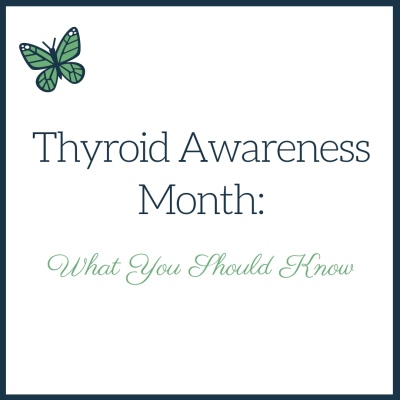 January is Thyroid Awareness Month and I wanted to take a moment to share what this means and what thyroid disease entails. I also want to make y’all are fully aware that I am not a medical professional and this post is only meant to raise awareness of thyroid disease through the research I have done. Your thyroid is a butterfly-shaped gland that sits low on the front of your neck and has many functions I never really knew about, but I am going to share them with you.
January is Thyroid Awareness Month and I wanted to take a moment to share what this means and what thyroid disease entails. I also want to make y’all are fully aware that I am not a medical professional and this post is only meant to raise awareness of thyroid disease through the research I have done. Your thyroid is a butterfly-shaped gland that sits low on the front of your neck and has many functions I never really knew about, but I am going to share them with you.
Approximately 20 million Americans suffer from a thyroid disorder and millions more worldwide. A couple common issues include thyroid nodules and enlarged thyroid glands, which can have cancer within them. The thyroid gland produces hormones that regulate the body’s metabolic rate, heart rate, blood pressure, 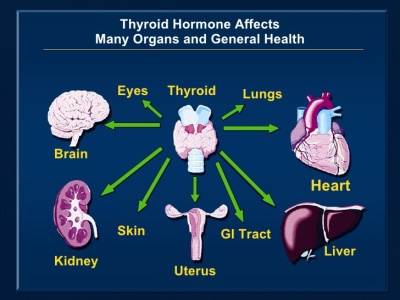 temperature, heart and digestive function, muscle control, brain development, mood, and bone maintenance. I am going to tell you what hypothyroidism and hyperthyroidism means.
temperature, heart and digestive function, muscle control, brain development, mood, and bone maintenance. I am going to tell you what hypothyroidism and hyperthyroidism means.
Hypothyroidism is a condition when the body does not produce enough thyroid hormones. This condition affects 1-2% of people worldwide, but women are affected ten times more than men. Some common signs and symptoms include fatigue, increased sensitivity to cold, constipation, itchy and dry skin, weight gain, muscle weakness, puffy face, hoarseness, hair loss, depression, trouble concentrating and memory problems.
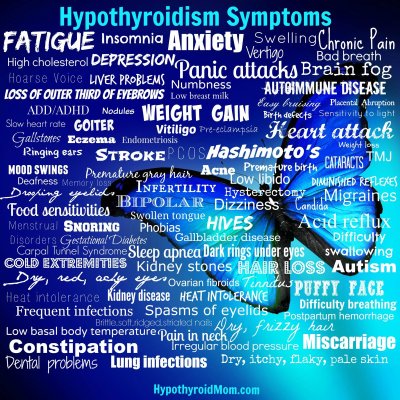 There are several ways a doctor can use to diagnose hypothyroidism. First, they are going to want to know about the following:
There are several ways a doctor can use to diagnose hypothyroidism. First, they are going to want to know about the following:
- The general state of health and any changes that have been noticed.
- Family medical history and if anyone in the family has been diagnosed with thyroid disease.
- Your doctor will want to know if you have had any thyroid surgery or radiation to the neck because of cancer.
- Your doctor will want to know any medications you are currently taking because some medications can trigger thyroid complications.
Second, you will need a physical examination searching for any signs of hypothyroidism including:
- Evidence of dry skin
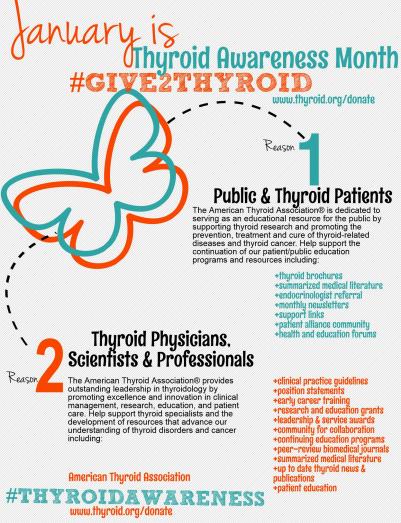
- Swelling around the eyes and swelling in the legs
- Slower reflexes
- Slower heart rate
Third, your doctor will perform blood tests.
- TSH stands for Thyroid-Stimulating Hormone. This test measures the amount of Thyroxine (T4) the thyroid is being signaled to make. Abnormally high levels can indicate hypothyroidism.
- Free T4 test is used to find out how well your thyroid gland is working. This test can be used to test for hypothyroidism or hyperthyroidism.
90% of primary Hypothyroidism disease is caused by Hashimoto’s Thyroiditis, which is a disease when the immune system, attacks the thyroid. Other causes of Hypothyroidism are iodine deficiency, genetic disorder, certain medications and surgery that removed part of the thyroid.
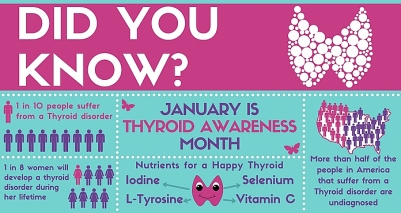 There are foods that should be avoided or at least consumed in moderation if diagnosed with Hypothyroidism. Foods to avoid are all types of millet, highly processed foods, supplements containing too much selenium and iodine. The foods and beverages that should be consumed in moderation are soy-based foods, broccoli, kale, spinach, cabbage, peaches, pears, strawberries, and coffee, green tea, and alcohol because they can irritate your thyroid gland.
There are foods that should be avoided or at least consumed in moderation if diagnosed with Hypothyroidism. Foods to avoid are all types of millet, highly processed foods, supplements containing too much selenium and iodine. The foods and beverages that should be consumed in moderation are soy-based foods, broccoli, kale, spinach, cabbage, peaches, pears, strawberries, and coffee, green tea, and alcohol because they can irritate your thyroid gland.
Hyperthyroidism, which is referred to as an overactive thyroid, is when the thyroid 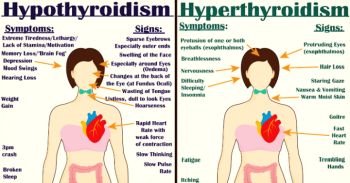 gland produces too much of the thyroxine hormone. Hyperthyroidism can cause anxiety, nervousness, rapid heart rate, unexpected weight loss, and high blood pressure.
gland produces too much of the thyroxine hormone. Hyperthyroidism can cause anxiety, nervousness, rapid heart rate, unexpected weight loss, and high blood pressure.
Two causes of hyperthyroidism are Grave’s disease and toxic nodular goiter. Grave’s disease is an autoimmune disorder where the immune system attacks the thyroid causing it to make more thyroid hormone than the body needs. Toxic Nodular Goiter is a thyroid gland containing autonomously functioning thyroid nodules. Both of these issues can be treated with medications, radioactive iodine or thyroidectomy, which is the removal of all or part of the thyroid gland.
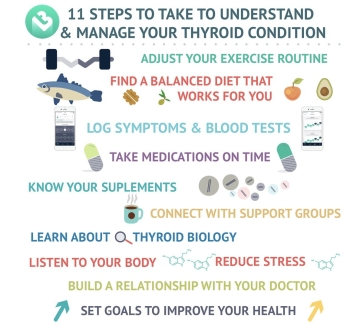
There are foods that should be avoided and foods that are encouraged to eat with hyperthyroidism. The foods to be avoided in excessive amounts are:
- Iodized salt
- Fish and Shellfish
- Egg yolks
- Dairy products
- Iodine supplements
- Foods that contain red dye
The foods that are encouraged to eat are:
- Non-iodized salt
- Coffee or tea, without milk, Dairy or soy-based creamers
- Egg whites
- Fresh or canned fruits
- Homemade bread or bread without salt, dairy and, eggs
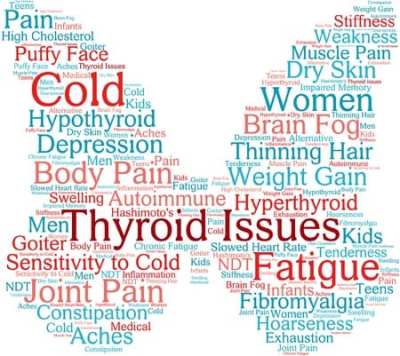
- Popcorn with non-iodized salt
- Oats
It is always very important to prepare and plan ahead with all doctor’s appointments. Most people will start out with their family physician but will end up being referred to a specialist. When dealing with hyperthyroidism or hypothyroidism, your referral will be with an endocrinologist that specializes in the body’s hormone-secreting glands.
We only have a short amount of time with a specialist and need to make the most of that 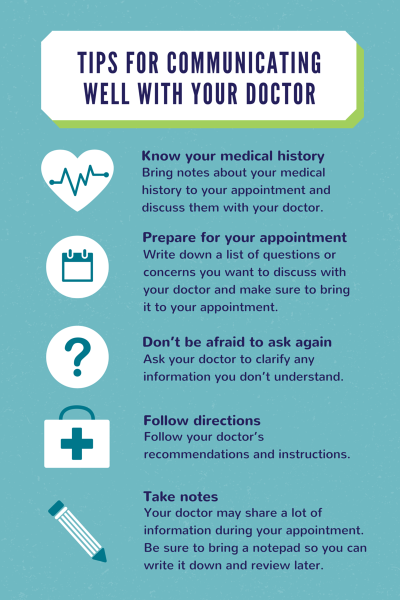 time. The following will help you prepare for your appointment and stay on track.
time. The following will help you prepare for your appointment and stay on track.
- When you are scheduling your appointment, ask if there is anything you need to do in advance to prepare. For instance, are there any restrictions on you for the appointment?
- Write down any and all symptoms you are experiencing. It does not matter how small they seem or how irrelevant you think they are, the doctor may think differently and it may help with options.
- Write down important personal information to share with your doctor. It may not seem important because they are things you are used to dealing with, but sharing any stressors or life changes may be more important than we think.
- Making a list of any medications you are currently taking, including vitamins and supplements to share with your doctor will be helpful for you and your doctor. This will be especially helpful if anything you are taking could cause your thyroid to become irritated.
- Having a family member or close friend come to appointments with you can have many benefits. The person that comes along with you can help you remember important things to discuss with your doctor and remember details of the appointment later on. Moral support is also very beneficial.
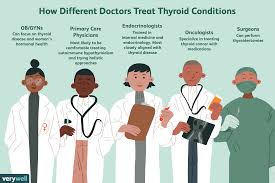
- Before an appointment, we all think of many questions we want to be sure we ask the doctor, but once in the exam room, it is easy to forget the questions. Writing a list of questions and or concerns you want to discuss will keep you on point and not forget any of those important questions you had prior to the appointment.
I am going to share a few basic ideas for questions to ask a physician during an appointment. Again, these are just ideas and you might have many others that concern you more.
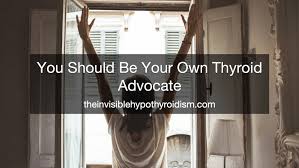
- What’s the most likely cause of my symptoms?
- What tests do I need?
- What treatment options do you recommend?
- Are there generic alternatives to the medication/medications you are prescribing?
- Do you have brochures I can take home to read? What websites would you recommend?
You should always expect your doctor to have questions for you during an appointment as well. Some very common questions a doctor may ask are:
- When did you begin having these symptoms?
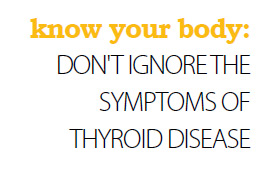
- Are the symptoms you have continuous or occasional?
- How severe have these symptoms been? On a scale of 1-10?
- Does anything improve or worsen the symptoms you are dealing with?
The most common symptom for Hypothyroidism is an unexpected weight gain. The additional weight gain is typically due to an excess of salt and water. Depending on the severity of Hypothyroidism, weight gain can be between 5 and 10 pounds. To help combat weight gain there are a few tips that can assist you in maintaining a healthy weight.
- Rest is vital! Getting any less than 7-8 hours of sleep nightly can contribute to weight gain, especially around the mid-section.
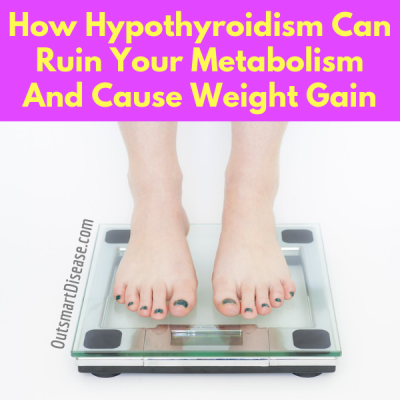 Mindful eating is important. This means you need to pay close attention to what you are eating, why you are eating, and how fast you eat.
Mindful eating is important. This means you need to pay close attention to what you are eating, why you are eating, and how fast you eat.- Practicing yoga and or meditation can help you to de-stress, which in turn can improve your overall health.
- A low to moderate carb diet can be helpful, but at the same time, too few carbs may lower your thyroid hormones. It might take time, but it is important to find the perfect balance.
I know this post has been rather long and I will be wrapping it up soon, but I do want to quickly share treatment options for both hypothyroidism and hyperthyroidism with y’all. When treating an overactive thyroid, hypothyroidism, you can use oral medication levothyroxine. Levothyroxine works to restore adequate hormone levels and even 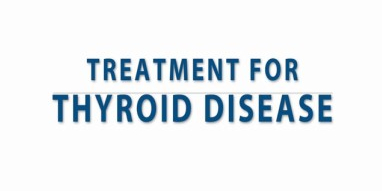 reverse the symptoms involved. The use of radioactive iodine can be used when treating hyperthyroidism. Radioactive iodine is taken orally and absorbed by the thyroid gland causing the gland to shrink. This can cause the thyroid activity to slow enough to change its status from overactive to under-active making it possible to need daily medication to replace the thyroxine.
reverse the symptoms involved. The use of radioactive iodine can be used when treating hyperthyroidism. Radioactive iodine is taken orally and absorbed by the thyroid gland causing the gland to shrink. This can cause the thyroid activity to slow enough to change its status from overactive to under-active making it possible to need daily medication to replace the thyroxine.
First, thank you for visiting my site today. I hope this information was helpful to you or  has provided you with information to help someone you know. Sometimes all it takes is having a little knowledge to understand what someone else might be dealing with. Second, I appreciate you taking the time to read one of my longest posts. I typically try keeping things short so you don’t feel like you are reading a short book. And last, I am looking forward to reading your thoughts about thyroid disorders. Y’all may have additional information that will help me or someone else in the blogging community to understand even more about this
has provided you with information to help someone you know. Sometimes all it takes is having a little knowledge to understand what someone else might be dealing with. Second, I appreciate you taking the time to read one of my longest posts. I typically try keeping things short so you don’t feel like you are reading a short book. And last, I am looking forward to reading your thoughts about thyroid disorders. Y’all may have additional information that will help me or someone else in the blogging community to understand even more about this  topic.
topic.
I hope your weekend has started off great and you are feeling well. No matter what you are doing this weekend, I hope it is filling you with happiness. Please remember that I am always sending y’all LOTS of love , comfort, and many positive vibes!

Always, Alyssa

Wow very informative! You sure did a lot of research. I hope this can help someone get the treatment they need. You don’t have to suffer. There are treatments that can help you live a productive life and most of all, feel better. Great job Alyssa! All my Love & Support, Mom!!
LikeLiked by 1 person
Reblogged this on Survivors Blog Here.
LikeLike
Three of my girlfriends suffer from it so this helped understand better. Thanks for sharing.
LikeLiked by 1 person
I am glad this information provided you helpful information.
LikeLiked by 1 person
Great to read this—my mother has hyperthyroidism and takes meds every day. I’ve been tested a couple of times because of that but so far so good!
LikeLiked by 1 person
I am glad this was good information for you. I am also glad your tests have been negative so far and hope it always is. Please give your mother my best and to always stay positive!
LikeLiked by 1 person
Thank you😊
LikeLiked by 1 person
My pleasure!
LikeLiked by 1 person
Wow, this is fantastic! I started a similar style of informative post for Thyroid Awareness Month… but then January seemed to go so quickly and I haven’t finished it. I’m glad you’ve covered it so, so well (so I don’t have to finish mine 😂). You’ve included included all about iodine which is brilliant as they often gets missed out. Fab post, Alyssa!
xx
LikeLiked by 1 person
What a great post. I still haven’t had a chance to release my Thyroid Awareness jewelry on my website yet, the Thyroid gland is a butterfly shape so they were going to be butterfly jewelry and January has come and gone. Oh well next year.
LikeLiked by 1 person
Thank you, I am glad you liked this post.
LikeLike